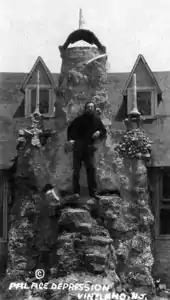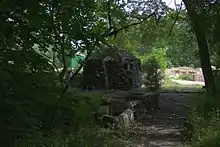Palace of Depression
The Palace of Depression (or Palace Depression) was a building made of junk that was located in Vineland, New Jersey, built by the eccentric George Daynor, a former Alaska gold miner who lost his fortune in the Wall Street Crash of 1929. This amusement was known as "The Strangest House in the World" and the "Home of Junk" and was built as a testament of willpower against the effects of The Great Depression.[1]

History
Beginnings

George Daynor claims that he was guided to New Jersey by an angel, who provided the design for the palace. Completed on Christmas Day 1932, the palace was built on 4 acres (16,000 m2) which cost him four dollars. Daynor said that his palace was "the greatest piece of originality ever brought about in the history of Man." He would charge 25 cents for a tour.[1]
Daynor was a publicity hog and claimed to be "the most photographed man in the world." After Peter Weinberger was kidnapped on 4 July 1956,[lower-alpha 1] Daynor called the FBI and falsely reported that the kidnappers had visited the palace. The FBI followed the false claim and Daynor was imprisoned for a year.[1]
The Palace of Depression was linked with another disappearance, that of William Ebeneezer Jones III, who went missing in 1962; the grounds of the Palace of Depression were dug up, but no body was ever found.[lower-alpha 2]
Decline

Daynor died a pauper in 1964 at a reported 104 years old. After Daynor's death, a fire destroyed the Palace of Depression and Vineland razed it in 1969.
Restoration
As of 2001, a city restoration project to rebuild the Palace of Depression was in progress. Local companies and individuals were encouraged to volunteer materials and labor. Kevin Kirchner initially started the effort in 1998 and has led the restoration effort since its beginning. It took about three years just to obtain the permits and clear the wooded property before actual re-construction of The Palace began in 2001. As of 2017 much of the Palace building itself has been rebuilt and an adjacent Historical Center/Museum was also erected on the site. The project is scheduled to tentatively take another two years before opened to the public regularly. The Palace is currently open to the public for tours in limited capacity.
In pop culture
- In 1938 George Daynor made a film about his park entitled The Fantastic Palace.
- The 1983 film Eddie and the Cruisers references the Palace of Depression.
- The Trenton rock n' roll band the Cryptkeeper Five titled a 2006 album Rise of the Palace Depression.
Notes
- Peter Weinberger, born 6 June 1956, son of Morris and Beatrice Ziefman Weinberger was kidnapped when 33 days old on 4 July 1956 from his home at 17 Albemarle Road, Westbury, Long Island and left to die near Northern State Parkway in Plainview, Long Island. His body was discovered in a thicket on 24 August 1956. Angelo John LaMarca confessed to the kidnapping and was executed at Sing Sing on 7 August 1958.[2][3]
- After three-year-old William “Billy” Jones was reported missing from his home in Vineland, New Jersey, on 17 December 1962, investigators dug up the grounds of the Palace of Depression.[4][5]
References
- "Palace of Depression, Vineland, New Jersey". Roadside America. Retrieved October 2, 2007.
- Bracker, Milton (25 August 1956). "Weinberger Baby Found Dead in L.I." (PDF). The New York Times. p. 1. Retrieved 17 December 2011.
- "La Marca Executed for Kidnap-Slaying" (PDF). The New York Times. 8 August 1958. p. 38. Retrieved 17 December 2011.
- Marko, Deborah M. (17 December 2011). "Police work on 49-year mystery of lost boy". Courier Post. Cherry Hill, New Jersey. Archived from the original on 5 January 2015. Retrieved 5 January 2015.
- "William Ebenezer Jones III". MissingKids.com. National Center for Missing and Exploited Children. Retrieved 17 December 2011.
External links
- The Palace of Depression Official Site
- RoadSide America entry
- The Fantastic Palace, a documentary about the Palace of Depression, on IMDb
- Coilhouse.
- Spaces Archives